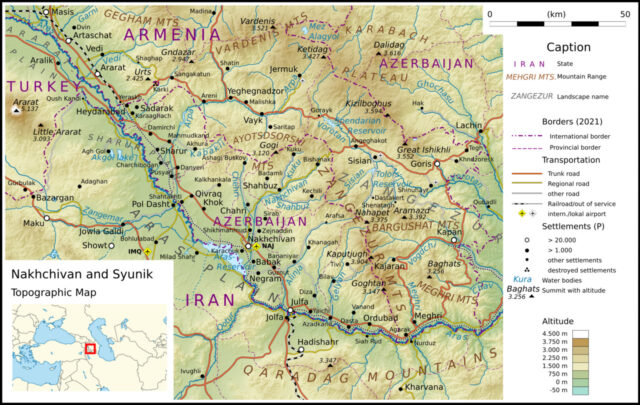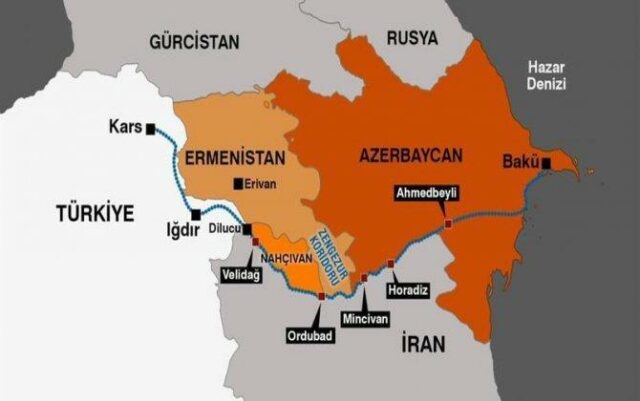
Kavkaz Files ISSN 2975-0474 Volume Issue 18 Issue 9
Author: Giuliano Bifolchi & Silvia Boltuc
Erdogan’s planned visit to Nakhchivan following Baku’s military offensive in Nagorno-Karabakh has raised significant concerns regarding the territorial integrity of Armenia.
There is a credible apprehension that Azerbaijan and Turkey, in alignment with their shared strategic interests, may actively seek to establish the conditions for a potential military intervention in Armenia’s Syunik Province, with the ultimate aim of securing the Zangezur Corridor.
Such a move could effectively isolate Armenia and facilitate the unification of Azerbaijani and Turkish territories.
The grounds for such an intervention might be the apparent external threat originating from Armenia towards Nakhchivan, a possibility that, while not immediate, continues to be plausible because of the enduring geopolitical aspirations of Ankara and Baku.
Erdogan’s Visit to Nakhchivan: Background Information
On Monday 25th, 2023, Turkish President Recep Tayyip Erdogan will meet Azerbaijani President Ilham Aliyev in the exclave of Nakhchivan. The visit follows Baku’s military offensive against Nagorno-Karabakh, which ended with the capitulation of Stepanakert and highlighted Turkish support for Azerbaijan.
According to Turkish and local sources, the meeting will address not only the recent Baku’s military operation but also the issue of the Zangezur Corridor, which Turkey and Azerbaijan consider fundamental to connect Nakhchivan with the Azerbaijani territory.
Turkish President Recep Tayyip Erdogan’s recent address at the annual United Nations General Assembly in New York underscores Turkey’s expectations from Armenia, particularly in upholding commitments related to the opening of the Zangezur Corridor.
During the visit, the two presidents will attend the ceremony of the Iğdır-Nakhchivan Natural Gas Pipeline, a testament to the strengthening energy ties between Turkey and Azerbaijan, and the inauguration of the Nakhchivan Military Complex, signifying the continuous development of strategic capabilities in the region.
It should be mentioned that, after over nine months of Azerbaijani blockade of the Lachin Corridor, on September 19th, 2023, Azerbaijan started a military offensive within the confines of Nagorno-Karabakh which led to the capitulation of Stepanakert, culminating in a ceasefire agreement on September 20th, 2023.
Geopolitical Scenario
Nakhchivan Autonomous Republic is an Azerbaijani exclave in proximity to Armenia, Iran, and Turkey. Baku has always stated that Armenia has isolated this exclave from the Azerbaijani territory, although Nakhchivan might economically cooperate with neighbouring Turkey and Iran.
The establishment of the Iğdir-Nakhchivan natural gas pipeline represents a significant milestone, because this infrastructure might supply gas from the Trans-Anatolian Gas Pipeline (TANAP) in Turkey to the Nakhchivan Autonomous Republic, replacing the current gas supply from Iran.
Ankara’s substantial influence in Nakhchivan could pave the way for the establishment of a robust transport corridor, positioning the South Caucasus as a potential focal point for emerging Asian powers.
The Zangezur Corridor represents a pivotal concept in the realm of regional transportation, offering Azerbaijan an unimpeded route to its Nakhchivan exclave, bypassing Armenian checkpoints as it traverses through Armenian Syunik Province near the Tehran-Yerevan border. This corridor constitutes a critical segment of a strategic transportation network that spans from Baku to Turkey’s Kars province, transiting through Armenia.
Moscow’s interest in the corridor’s implementation aligns with its long-term strategic goals, aiming to forge alliances that safeguard Russian influence in the region, potentially establishing dependent states crucial to preserving Russian interests, and fortifying control over territories beyond the prospective purview of a NATO intervention.
Beyond its geopolitical implications, the Zangezur Corridor assumes a central role in enhancing not only regional but also Eurasian connectivity, exerting a far-reaching impact in the Caucasus geopolitical landscape.
At the beginning of September 2023, Azerbaijani Foreign Affairs Minster Jeyhun Bayramov accentuated Zangezur Corridor’s importance, which Baku interprets as a significant milestone in the realm of regional cargo transportation, with projections showing an augmentation of throughput along the Middle Corridor by about 5 to 8 million tons annually.
Bayramov affirmed Baku’s steadfast commitment to advancing this project, even considering alternative strategies (“Plan B”) if necessary. Notably, the Azerbaijani government has set an ambitious timeline, aiming to conclude all necessary work within its territory by 2024 to facilitate the operationalisation of the corridor.
While Armenia does not oppose the idea of opening up regional transport links, it asserts the imperative of upholding the sovereignty and jurisdiction of the countries through whose territories these vital communications will traverse.

The recent Azerbaijani military operation in Nagorno-Karabakh has underscored the strengthened alignment between Baku, Ankara, and Moscow in their approach to the Caucasus region. Azerbaijan’s official communication regarding the operation included notification to both Russia and Turkey, signifying Moscow’s tacit endorsement of the initiative.
This development reflects a shift in Russia’s strategy within the Caucasus, where it has expanded its collaboration with Azerbaijan, driven in part by Moscow’s vested interests in energy and transportation projects.
Despite Armenia’s membership in the Collective Security Treaty Organisation (CSTO), the Kremlin has exhibited a measured stance in providing direct military support to Yerevan against external threats, as evidenced in the 2022 Azerbaijani attack on Armenian territory. This calculated approach has been further evident in the relative non-intervention of Russian peacekeepers in Nagorno-Karabakh, even amidst Azeri military actions targeting Armenian civilians.
The strategic significance of the Zangezur Corridor factors prominently into the Kremlin’s regional calculus, influencing its response to potential developments in the area. In the event of an Azerbaijani offensive, Moscow may exercise caution in intervening, particularly if Ankara and Baku might furnish some evidence of a possible external threat emanating from Armenia’s Syunik Province towards Nakhchivan.
The emergence of reports on social media and in Turkish media regarding the alleged mobilisation of Armenian groups from Nagorno-Karabakh towards the Zangezur Corridor raises significant concerns about the potential escalation of tensions in the region.
Such developments have the potential to serve as a pretext for a joint Turkish-Azerbaijani military intervention in the Syunik Province, further complicating the situation. Moreover, it could provide Moscow with a rationale to abstain from invoking CSTO intervention to support Armenia, given the ambiguous nature of the situation.
The stance of the Islamic Republic of Iran on this matter is unequivocal. Tehran has consistently expressed its support for the territorial integrity of Armenia, emphasising its opposition to any alterations or military actions in the Syunik Province.
The basis of this position lies in Tehran’s acknowledgement of the province’s crucial role in preserving the essential link between Armenia and Iran. The Syunik Province serves as a linchpin in averting the isolation of Yerevan, underlining the significant geopolitical implications associated with its territorial integrity.
As tensions persist in the region, Iran’s position might, on the one hand, guarantee a support to Armenia in a period characterised by international immobility or lack of action towards Nagorno-Karabakh.
On the other hand, Iran’s firm position about the Syunik Province and a possible Azerbaijani military operation in the area might further exacerbate the situation and open a conflict which might involve also Turkey, a NATO member.
Conclusion
The forthcoming meeting between Erdogan and Aliyev in Nakhchivan carries profound implications for the volatile dynamics in the Caucasus, potentially precipitating a new phase of regional tensions that could escalate into a broader conflict.
Moscow’s collaboration with Ankara and Baku, coupled with its reservations towards Armenian Prime Minister Nikol Pashinyan, suggests a recalibration of Russia’s stance in favour of Azerbaijan and Turkey. This shift in alignment is notable, particularly given Armenia’s membership in CSTO and the Eurasian Economic Union (EAEU).
The strategic significance of the Zangezur corridor, which could also serve Russian interests, further reinforces this dynamic, underscoring the complexities of the geopolitical landscape in the South Caucasus.
Iran’s position in response to the emerging Azeri-Turkish axis is a critical factor in the evolving regional scenario. Given Tehran’s history of supporting Armenian territorial integrity, the Islamic Republic will monitor developments closely to ensure that Armenia does not become isolated and that its relationship with Iran stays intact.
The potential ramifications of the Turkish-Azerbaijani territory being linked through Nakhchivan are a cause for concern in Tehran, given its proximity to the Islamic Republic’s borders. This situation places Iran at a significant juncture, as its response could potentially influence the trajectory of events in the South Caucasus.
The European Union’s part in the current developments cannot be ignored, even though Brussels seems to have a limited and uninvolved presence in the Caucasus. A potential strengthening of Moscow’s ties with Baku and Ankara, particularly in energy cooperation and natural gas exports, could pose a substantial challenge to the EU Energy Security Strategy.
Any significant shift in energy dynamics in the region has the potential to impact Europe’s energy security, prompting the need for a more active EU engagement in the South Caucasus to safeguard its strategic interests.
Do you like SpecialEurasia reports and analyses? Has our groundbreaking research empowered you or your team? Now is your chance to be a part of our mission! Join us in advancing independent reporting and unlocking the secrets of Eurasia’s complex geopolitical landscape. Whether through a one-time contribution or a monthly/yearly donation, your support will fuel our relentless pursuit of knowledge and understanding. Together, let’s pave the way for a brighter future. DONATE NOW and secure your place in shaping the geopolitical narrative.
